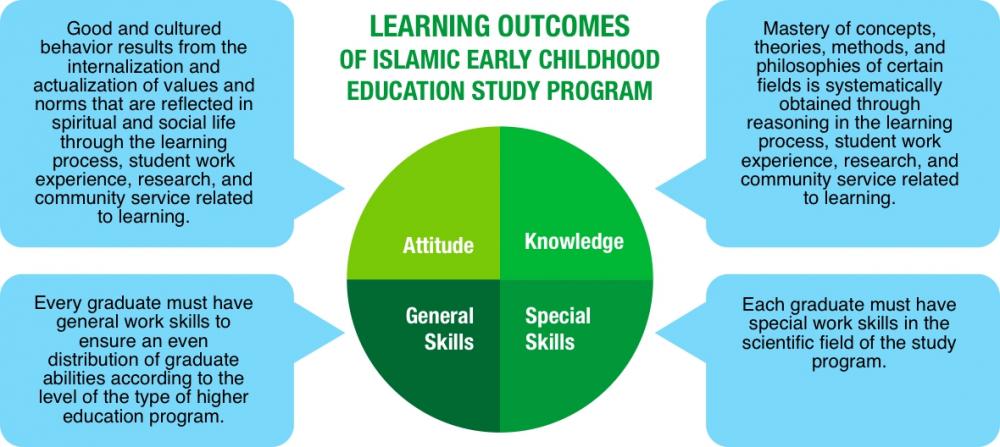Attitude
- Fear God almighty and be able to demonstrate religious and spiritual attitudes, uphold human values as early childhood educators based on religion, morals, and ethics, have empathy, sympathy, and tolerance for the diversity of cultures, views, religions, and beliefs, wisdom local, other people's opinion or original findings [S1];
- Act as citizens who are proud and love their homeland, have nationalism and a sense of responsibility to the state and nation, contribute actively, creatively, and scientifically to improving the quality of life in society, nation, state, and progress of civilization based on Pancasila, and can work together and have social sensitivity and concern for society and the environment [S2];
- Be a role model in obedience to law and discipline in the life of society and the state and be able to demonstrate a responsible attitude and high integrity as an early childhood educator diligently, independently, and competitively by internalizing academic values, norms and ethics, the spirit of independence, struggle, entrepreneurship, and hard work [S3].
Knowledge
- Mastering the theoretical concepts of early childhood Islamic education, which is integrated with Islamic values, Indonesianness, and local wisdom [P1];
- Mastering the theoretical concepts of family, community, and early childhood relationships comprehensively [P2];
- Mastering the theoretical concepts of curriculum, learning, learning environment, and assessment of early childhood Islamic education appropriately and sincerely [P3];
- Mastering the theoretical concepts of safety, health, and nutrition in depth that support the growth and development of early childhood [P4];
- Mastering the theoretical concepts of professionalism, leadership, administration, and management in early childhood Islamic education [P5];
- Mastering the concept of communicating using spoken and written language in early childhood Islamic education [P6];
- Mastering the concept of entrepreneurship in Islamic Early Childhood Education comprehensively [P7].
General Skills
- Able to apply logical, critical, systematic, innovative, and integrative-interconnective thinking in the development and implementation of Islamic science, science, and technology in the field of early childhood Islamic education in the Indonesian context [KU1];
- Able to examine pedagogical implications and make appropriate decisions through deliberation in problem-solving and the development of early childhood Islamic education [KU2];
- Able to maintain and develop a network of cooperation with supervisors, colleagues, peers, and other stakeholders [KU3].
Special Skills
- Able to integrate Islamic values, Indonesianness, and local wisdom in the theoretical concepts of early childhood education [KK1];
- Able to develop characteristics, parenting, and involvement of families and communities in the growth and development of children comprehensively [KK2];
- Able to design curriculum, learning management, learning environment, and assessment techniques for early childhood Islamic education appropriately and in-depth [KK3];
- Able to design programs and procedures in the practice of safety, health, and nutrition according to the developmental stage and needs of early childhood [KK4];
- Able to develop professional competence, leadership, administration, and management in the implementation of Islamic education for early childhood in an integrative holistic manner [KK5];
- Able to communicate using spoken and written language using information and communication technology in Early Childhood Islamic Education [KK6];
- Able to comprehensively design a variety of entrepreneurship in early childhood Islamic education [KK7].

